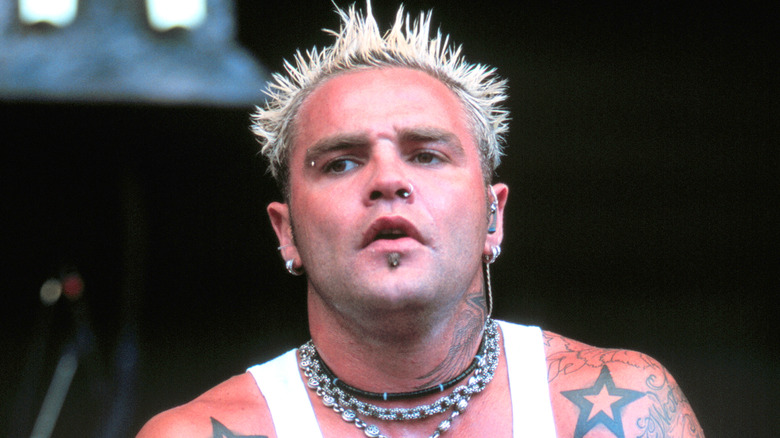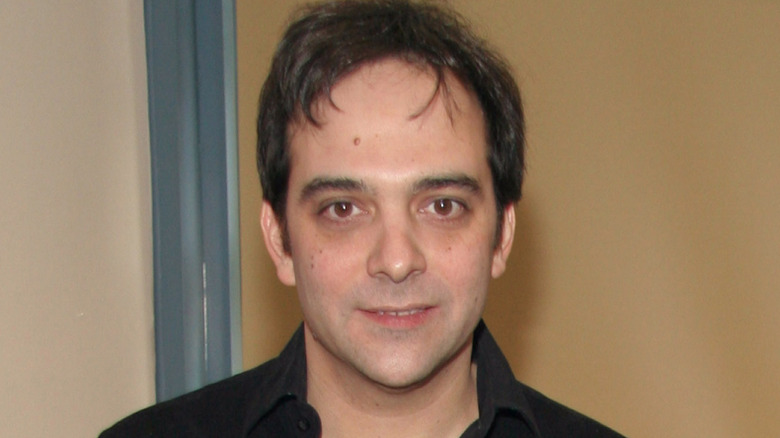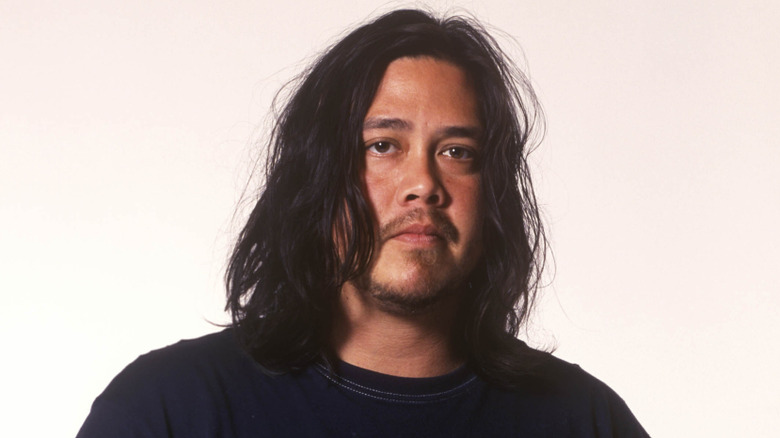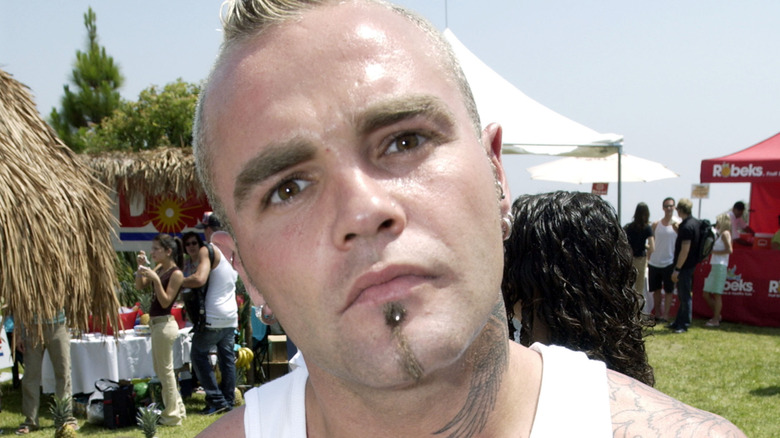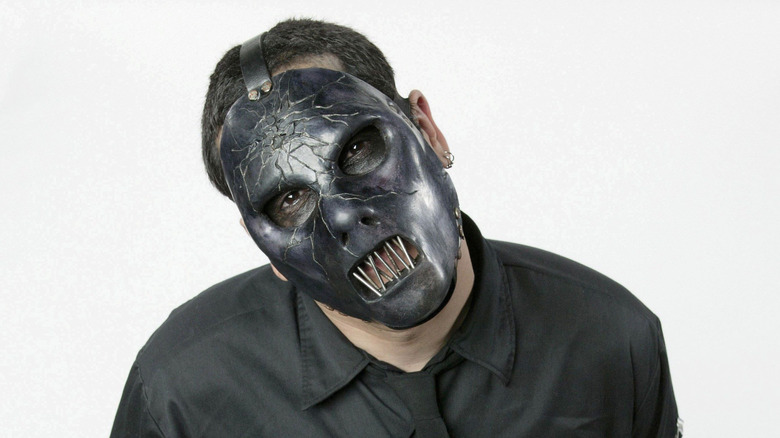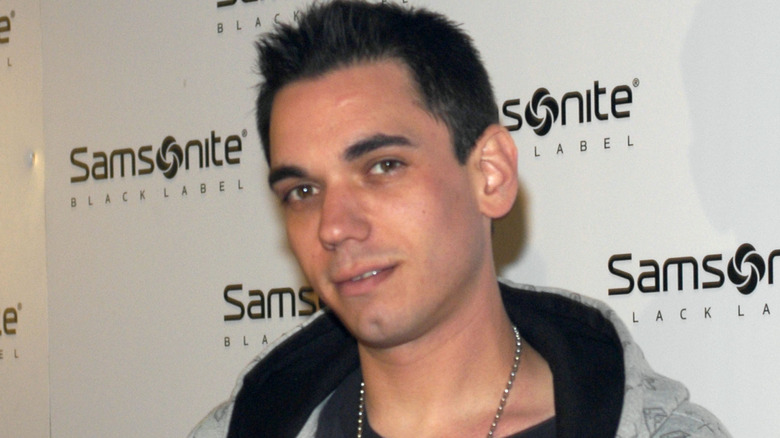'00s Musicians Who Died And No One Noticed
If there's any one word that could define the popular music of the new millennium, it would have to be transitional. With the messed-up music industry of the 2000s calling the shots, everyone in the business of recording dealt with a move from CDs to digital delivery, as well as the more exciting blending of genres. Music at the turn of the 21st century sounded like change in action, as rap combined with rock, hip-hop converged with pop, grunge moved into metal, and new takes on bubblegum and teen pop surged.
So many of the people most responsible for those adaptations, who sold millions of units and resonated with fans, sadly didn't live long enough to see the lasting impact of their artistic efforts. A great number of pop and rock stars of the first decade of the new century died too young, and not too far after their commercial and critical triumphs. Even worse is that their deaths were largely under-reported in the media. Here are all the musicians known for their major successes in the 2000s whose eventual deaths flew under the pop culture news radar.
The following article mentions addiction issues.
Adam Schlesinger
If 1990s or 2000s music fans or Hollywood productions needed catchy, hook-laden '70s throwback power pop or a mildly ironic song that sounded like it could be a hit in a fictional world, Adam Schlesinger was usually the person who could be counted on to deliver. Schlesinger was a guitarist and chief songwriter in two pop-friendly alternative rock bands that got started in the 1990s, Ivy and Fountains of Wayne, the latter of which released the indefatigable older-woman-crush song "Stacy's Mom" in 2003. Schlesinger also composed the titular theme song for the '60s rock comedy "That Thing You Do!" as well as tunes for "Music and Lyrics," "Josie and the Pussycats," and the CW musical comedy "Crazy Ex-Girlfriend."
Schlesinger was sadly among the first musicians who contracted coronavirus as the COVID-19 pandemic developed in the spring of 2020. In late March, Schlesinger was admitted to a hospital in New York state, where he was quickly sedated and placed on a ventilator. A week later, and after some brief indications of improvement, Schlesinger died from the effects of COVID-19. He was 52 years old.
Dave Williams
Drowning Pool checked all the boxes of what an early 2000s nu-metal band ought to embody. The guitars were heavy, the lyrics concerned anger, frustration, and sadness, and lead singer Dave "Stage" Williams offered the correct mix of sweetly melodic vocals, growling, and screaming. Embraced by the metal community at large and with Williams at the helm, Drowning Pool played to the masses at Ozzfest while its propulsive single "Bodies" enjoyed a lot of airtime on rock radio and MTV.
Only about a year after its breakthrough and biggest hit, Drowning Pool lost its lead singer. On August 14, 2002, the band stopped its bus in Manassas, Virginia, to rest between stops on the Ozzfest tour, and Davie Williams was discovered deceased in his private area. An autopsy was unable to determine a cause of death, and so to debunk rumors that Williams had died as a result of overdose or substance-related misadventure, toxicology and other tests were conducted on the musician's remains. The 30-year-old died of natural causes, specifically a heart issue.
Wayne Swinny
Way back in 1996, a bunch of Memphis musicians who were in bands they didn't think were going anywhere joined forces to generate Saliva. Adopting and instituting an aggressive, sludgy, and hard sound that would be called nu-metal after other bands got onboard in the early 2000s, guitarist Wayne Swinny helped lead the group. Rock radio in the new millennium sounded a lot like Saliva, and Swinny's guitar powered lots of hits, such as "Click Click Boom," "Always," "Rest in Pieces," "Your Disease," and "Survival of the Sickest."
Mere hours after playing a Saliva show in Nashville on March 20, 2023, Swinny was rushed to an area hospital to treat a sudden brain hemorrhage. He remained in intensive care while the rest of Saliva continued to tour with a replacement for Swinny. Sadly, before any such show could take place, Swinny died in hospital. He was 59 years old.
Chi Cheng
Deftones took heavy metal into the 21st century, bringing with it a number of other influences and traditions. Formed in Sacramento in the late 1980s, Deftones blended the anguished screaming and shredding of metal with the odd tunings, minor keys, and introspection of the alternative rock of the day. As a result, when its third full-length album "White Pony" arrived in 2000, Deftones peaked commercially. The band couldn't have done it without the haunting, gurgling bass contributed by Chi Cheng, as heard on the signature hit singles "Change (in the House of Flies)" and "Back to School (Mini Maggit)."
In November 2008, Cheng was involved in a car accident in Santa Clara, California. Riding as a passenger, the bassist hadn't secured his seatbelt, and he was thrown from the car upon impact. Immediately paralyzed and entering a comatose state, Cheng survived but remained on life support. Two years later, Cheng was able to move his extremities lightly, and two years after that, he was discharged to home care. In 2013, Cheng tragically died from the lingering effects of the injuries he suffered in the 2008 accident, and died at the age of 42.
Bob Bryar
Theatrical, emotionally wrought, and also loud and heavy, goth rock went mainstream in the 2000s thanks in large part to the efforts of My Chemical Romance. As much of a progressive and conceptual performance collective and emo act as it was a goth band, My Chemical Romance's 2004 album "Three Cheers for Sweet Revenge" went triple platinum, and soon afterwards, drummer Bob Bryar joined the band. After playing on other hit albums like "The Black Parade" and "Danger Days: The True Lives of the Fabulous Killjoys," Bryar exited My Chemical Romance in 2010.
In November 2024, three weeks after Bryar last contacted relatives or friends, the drummer's body was discovered by an animal control worker in his home in Bedford County, Tennessee. Because Bryar had been deceased so long — possibly several weeks — it wasn't immediately clear how he died, and an autopsy wasn't able to solve the mystery since decomposition had set in, rendering most tests impossible or ineffective. Near Bryar's body, authorities found three tanks of nitrous oxide, but the coroner couldn't conclusively determine if the sedative was a factor in the musician's death at age 44.
MF Doom
The prolific musician born Daniel Dumile lived multiple creative lives. At one point, he performed his experimental, imaginative, and sample-utilizing hip-hop under the name Zev Love X, and with the '90s collective KMD. Then he adopted the MF Doom persona, and with Madlib made the classic 2000s rap opus "Madvillainy." That brought acclaim and a growing fanbase, bolstered by "The Mouse and the Mask," a collaboration with DJ Danger Mouse.
On December 31, 2020, MF Doom's wife, Jasmine Dumile, announced on her husband's Instagram account that the rapper had died at the age of 49, and exactly two months earlier. The death was so sudden that no reasonable cause could be determined without a thorough investigation, and in July 2023, the full story finally came together: The rapper had checked into a hospital in Leeds, England, for treatment after suffering adverse effects — breathing trouble and a swollen throat — from a recently prescribed blood pressure medicine. Before he lapsed into unconsciousness in the medical facility, MF Doom said he couldn't breathe, and then went into an ultimately fatal respiratory arrest.
Shifty Shellshock
In the late 1990s and early 2000s, a number of groups combined the most obvious and outward elements of hard rock and hip-hop to create the briefly but massively popular form of music called rap-rock. However, only Crazy Town took such a song to No. 1 on the Billboard pop chart: 2000's "Butterfly," a Red Hot Chili Peppers-sampling chilled-out, groove rock tune about the transformative power of love.
Crazy Town never came close to the Hot 100 ever again, but the front man who went by the name of Shifty Shellshock came to exemplify the millennium-era and its style of music in terms of appearance and vibes.
Known offstage and off record as Seth Binzer, Shifty Shellshock was found dead at his Los Angeles area home on June 24, 2024. "Seth has been struggling with substance abuse problems for quite some time," the rapper's agent, Howie Hubberman told Rolling Stone, hinting at the troubled history of Crazy Town and his client. That rep reported that Shifty Shellshock had died from a drug overdose, and that he was 49 years old.
Paul Gray
In the 2000s, Des Moines-based Slipknot captivated nu-metal fans with its exceptionally dark-natured, dreary, and emotionally challenging music, as recorded on its hit albums "Iowa" and "All Hope is Gone." But Slipknot was about more than just the music: It's also a theatrical project featuring as many as nine members at a time, all dressed in factory worker coveralls and grotesque, identity-concealing masks. The musicians adopted nicknames and numbers to go along with their personas, and founding bassist Paul Gray was also known as both "Pig" and "No. 2."
Among the most devastating moments in the tragic real-life story of Slipknot was the death of Gray. In May 2010, the musician died at a hotel in Urbandale, Iowa, after overdosing on a combination of the prescription painkillers morphine and fentanyl. The Slipknot member's pain relief specialist, Dr. Daniel Baldi, faced a lawsuit from Gray's family, and a settlement was reached in 2018 after he was blamed for the death of the 38-year-old musician.
DJ AM
The paparazzi and tabloid-oriented celebrity youth culture of the 2000s made stars out of some unlikely figures. These included heiresses and DJs, who curated and mixed the music of others to create something new that fueled the action at dance clubs and parties. At the center of it all was Adam Goldstein, better known by his stage name, DJ AM. Previously an anonymous club DJ, Goldstein got a lot more famous through a tumultuous mid-2000s relationship with "The Simple Life" star Nicole Richie. Formerly a member of the rap-rock group Crazy Town, Goldstein was soon getting paid a fortune to perform regularly at Caesars Palace in Las Vegas. He also popped up in "Iron Man 2" and the video game "DJ Hero."
The tragic real-life story of Blink-182 collided with that of DJ AM. In September 2008, TRV$DJ-AM, a supergroup made up of Blink-182 drummer Travis Barker and DJ AM, played a show in Columbia, South Carolina, and their small plane crashed just after the beginning of their return flight. Two of the six people on board survived: Barker and DJ AM. Only 11 months later, the latter died. The 36-year-old was discovered dead in his apartment in New York City next to various drugs and drug paraphernalia. The medical examiner's office attributed the death to a combined overdose of cocaine and six other narcotics, painkillers, and prescription medications.
Matt Roberts
One of the most low-key commercially dominant and important rock bands of the 2000s, 3 Doors Down just couldn't miss the rock chart's Top 40 for the better part of the decade. Time after time, the group took its singles — made in its grunge-hard rock-Southern rock mold — to No. 1, hard-chargers and ballads alike, such as "Kryptonite," "Loser," "Duck and Run," "When I'm Gone," and "It's Not My Time." Lead guitarist and founding member Matt Roberts helped write all those songs, and more.
After 16 years with the band he helped form, Roberts departed 3 Doors Down in 2012. In August 2016, he traveled to West Bend, Wisconsin, to play a military veterans charity concert, but tragically, he never took the stage. A staffer at the hotel where Roberts was staying called the local police with a report of an individual unconscious or asleep in a hallway of the building. There, authorities found Roberts and pronounced him dead. After it was determined that the musician died at age 38 from a prescription drug overdose, his Alabama doctor, Richard Snellgrove, was indicted and arrested (but ultimately acquitted) for his culpability in the fatality.
Carlos Marin
In the early 2000s, emboldened by the star-making abilities that he demonstrated on "Pop Idol" in the U.K. and "American Idol" in the U.S., Simon Cowell set his sights on popularizing a quartet that sang in the traditional forms of classical and opera, and in numerous Romance languages, too. Il Divo sold millions of albums across Europe and the Americas especially, and entertained world leaders with their highbrow music. The four-man operation's original baritone was German-born Spanish vocalist Carlos Marin, who captured what Cowell was looking for perhaps more than anyone else in Il Divo. Marin turned into something of an idol for grown-ups done with bubblegum pop, vocalizing passionately and charmingly, and always dressed impeccably.
On December 8, 2021, Marin complained of feeling extremely sick during a U.K. concert tour, and he was admitted to the intensive care wing at Manchester Royal Hospital. Diagnosed with COVID-19, complications from the disease claimed the life of the pop-classical singer. Marin was 53 years old.
Oli Herbert
With some of the most abrasive music to reach a vast audience, All That Remains dealt sound attacks on its audiences. Some of that quintessential metalcore came from the scream-sung vocals of Phil Labonte, and much of the rest came from the melodic cacophony of guitars from band founder Oli Herbert. In the 2000s and 2010s, All That Remains was a mainstay on the hard rock airwaves, particularly with singles like "Two Weeks," "Forever in Your Hands," and "Stand Up."
On October 16, 2018, Herbert's body was discovered in about 2 feet of water in a pond adjacent to the guitarist's home in Stafford Springs, Connecticut. The Connecticut State Police and the Eastern District Major Crime Squad both believed that it looked like Herbert's death could have been caused by foul play. Fans of All That Remains accused Herbert's wife, Beth, of using witchcraft (she self-identified as a pagan) to kill her husband, but those were unfounded rumors. After more than two years of detective work, a suspect was never identified in what may indeed have been a murder. Oli Herbert was 44 years old.
Wayne Static
A little bit thrash, a little bit industrial, and a little bit electronic, Static-X asserted itself into the radios of millions with its future-forward take on heavy metal. Highly recognizable in the nu-metal world for his extravagant beard, wild hair, and hyperactive vocalizing, lead singer Wayne Static (born Wayne Wells) named the group after his own stage name. Between 1999 and 2001, Static-X released the platinum-selling "Wisconsin Death Trip" and the gold-certified "Machine," which generated hits like "Push It," "Bled for Days," and "Cold."
On November 1, 2014, just weeks before he was supposed to lead his band on a tour with Drowning Pool and Powerman 5000, Static died in the middle of the night at his home in San Bernardino County, California. Four months later, a coroner's report detailed the circumstances of Static's death: He'd gone to bed having consumed a crushed oxycodone pill, a powerful prescription-strength painkiller, and drank alcohol with it. The next afternoon, Static's wife discovered the musician, unresponsive and stiff. The singer and guitarist was 48.
Daniel Williams
Christian metal band turned secular, anti-capitalist heavy rock band the Devil Wears Prada came together in Ohio in 2005. The group's original drummer was Daniel Williams, who pounded on the set across six albums, including the best-selling, indie album chart toppers "With Roots Above and Branches Below" and "Dead Throne." In 2016, Williams amicably departed the band he helped start and left music behind, opting instead for the tech industry — he worked at GoPro for eight years, and in 2025 he landed a position as a software engineer at Apple.
On May 22, 2025, Williams boarded a small Cessna Citation II aircraft along with Dave Shapiro, a talent agent whose firm represents the Devil Wears Prada. After taking off amidst thick morning fog from an airport in San Diego, where Williams lived, the plane crashed onto the grounds of a home in the Murphy Canyon neighborhood, a military family housing site. Around 100 people in the vicinity were evacuated, and hospitals treated many for injuries, while of the six people on the plane, two were immediately declared dead. One of them was Shapiro, and the other was Williams. The drummer was 39 years old.
If you or anyone you know needs help with addiction issues, help is available. Visit the Substance Abuse and Mental Health Services Administration website or contact SAMHSA's National Helpline at 1-800-662-HELP (4357).
